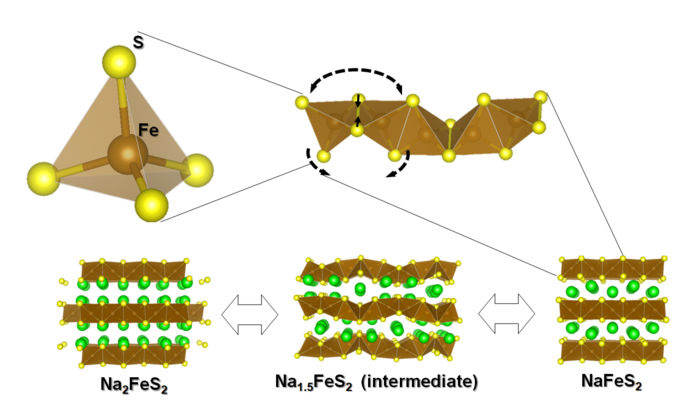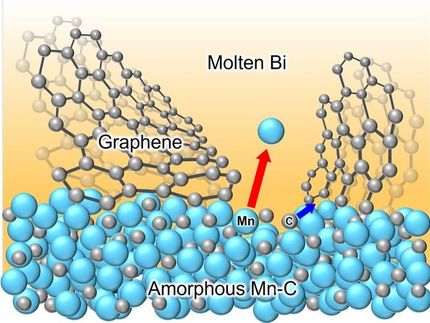New cheaper positive electrode material improves all-solid-state sodium batteries
Expected to improve high-capacity rechargeable batteries and make them cheaper by using common materials
The demand for high energy density rechargeable batteries, such as lithium-ion batteries, increases every year, as society shifts toward becoming carbon neutral. Sodium-ion batteries—which have a resource advantage over lithium-ion batteries—are attracting more attention, as cheap new high-performance materials continue to be developed.

Top left: an iron atom sits at the center of a tetrahedron (brown), surrounded by four sulfur atoms (yellow). Top right: multiple tetrahedra can be combined to form long chains, which can lie parallel to one another. Bottom: sodium atoms (green) enter or leave the tetrahedra, during oxidation and reduction, in a highly reversible way to charge or discharge the battery, while keeping the structure intact.
Atsushi Sakuda, OMU
A research group led by Associate Professor Atsushi Sakuda, President Masahiro Tatsumisago, and Professor Akitoshi Hayashi, at the Graduate School of Engineering, Osaka Metropolitan University, has successfully developed a new positive electrode, made of Na2FeS2, for all-solid-state sodium batteries. The batteries have a high energy storage capacity, high reversibility and use inexpensive elements that are readily available.
Furthermore, the batteries using the Na2FeS2 as a positive electrode can be charged and discharged for more than 300 cycles, due to the unique crystal structure of the Na2FeS2 that gives the electrode a long lifespan. Most high-capacity metal sulfide electrodes rely on conversion-type reactions, during which large rearrangements—during charging and discharging—are associated with inhomogeneous reactions and degradation. The Na2FeS2, on the other hand, achieves a high degree of reversibility during charging and discharging, by undergoing insertion-type reactions, which allow the electrode to retain its crystal structure over many cycles.
“The new Na2FeS2 positive electrodes are well balanced in terms of materials, cost, and lifetime; we expect them to be put to practical use in all-solid-state sodium batteries,” Professor Sakuda concluded. “In the future, we will continue our research to develop cheaper all-solid-state sodium batteries with even higher performance, by examining high input and output for rapid recharging, as well as making and testing of superior anode materials.”
Original publication
Other news from the department science
Most read news
More news from our other portals
See the theme worlds for related content
Topic World Battery Technology
The topic world Battery Technology combines relevant knowledge in a unique way. Here you will find everything about suppliers and their products, webinars, white papers, catalogs and brochures.

Topic World Battery Technology
The topic world Battery Technology combines relevant knowledge in a unique way. Here you will find everything about suppliers and their products, webinars, white papers, catalogs and brochures.




























































